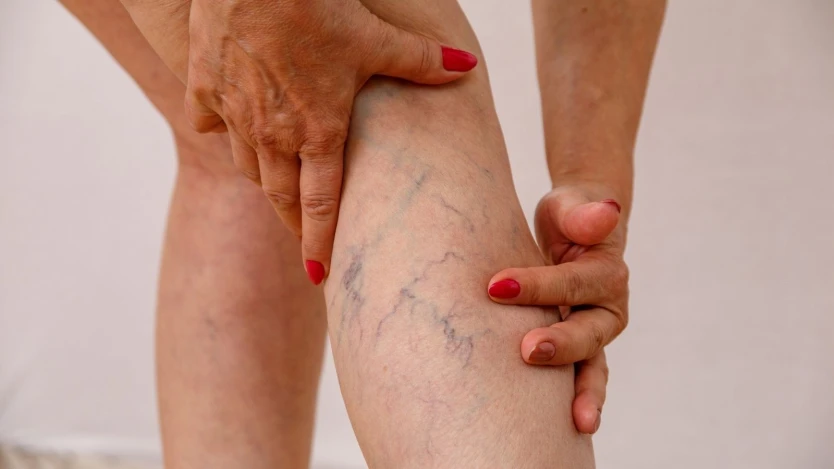Do Varicose Vein Symptoms Worsen at Night?
Varicose veins are a common condition in which veins, most often in the legs, become enlarged and twisted. These veins form when the valves within them weaken, allowing blood to pool rather than flow back to the heart efficiently. While many people experience mild discomfort from varicose veins, others can suffer from more severe symptoms, which often intensify at certain times of the day, particularly at night.
This article will explore whether varicose vein symptoms worsen at night, why this happens, and what you can do to alleviate the discomfort.

Understanding Varicose Veins
Before diving into how varicose vein symptoms behave at night, it’s important to understand how these veins form and the symptoms they typically cause. Varicose veins develop due to poor blood circulation in the lower extremities. This occurs when the tiny valves in the veins malfunction, leading to blood pooling and causing the veins to become distended.
Common causes include:
- Heredity (genetics)
- Standing or sitting for long periods
- Obesity
- Pregnancy
- Aging
Varicose veins are often associated with cosmetic concerns, but they can also lead to symptoms that interfere with daily life. Some of these symptoms can become more pronounced during the evening and nighttime.
Do Varicose Vein Symptoms Worsen at Night?
Many people with varicose veins report that their symptoms, such as pain, swelling, and leg cramps, tend to worsen in the evening or at night. Several factors contribute to this phenomenon.
1. Leg Fatigue and Heaviness
As the day progresses, especially after standing or sitting for extended periods, the blood begins to pool more in the lower legs due to gravity and inefficient circulation. This pooling can make the legs feel heavier and more fatigued by the time evening arrives. This discomfort can worsen when you lie down, especially if you don’t elevate your legs.
Why this happens at night: During the day, standing or sitting in one position for long periods can put stress on the veins, making it harder for blood to flow back to the heart. By the time you reach the evening, the veins are more swollen, and blood has pooled in the legs, leading to more pronounced heaviness and discomfort.
2. Increased Leg Pain
Varicose vein pain can become more noticeable at night for several reasons. The pooling of blood in the veins puts additional pressure on the vein walls and surrounding tissues, causing discomfort that intensifies as the day goes on.
Some individuals also experience a burning or throbbing sensation in their legs, which becomes more pronounced when they lie down at night. This can disrupt sleep and lead to nighttime discomfort.
3. Swelling (Edema)
Swelling in the legs is a common symptom of varicose veins, especially after long periods of standing or sitting. During the night, this swelling can worsen due to fluid buildup in the lower extremities. If you sleep with your legs flat on the bed, gravity causes more fluid to accumulate in the legs, increasing discomfort.
Why swelling worsens at night: The body tends to retain more fluids in the lower limbs after a day of activity, and without proper elevation or movement, this fluid can remain stagnant, leading to increased swelling.
4. Nighttime Leg Cramps
Many people with varicose veins experience leg cramps or muscle spasms at night. These cramps, which often occur in the calves, can cause sudden, intense pain that disrupts sleep. The exact cause of nighttime leg cramps is not entirely understood, but poor circulation related to varicose veins is a key contributor.
Restless Leg Syndrome (RLS) may also accompany varicose veins, causing an uncontrollable urge to move the legs during the night to relieve discomfort.
5. Restlessness and Difficulty Sleeping
Due to the combination of pain, heaviness, and leg cramps, many people with varicose veins struggle to get a good night’s sleep. Poor sleep can exacerbate symptoms, as the body relies on rest to repair and restore normal function, including circulation.
Why this happens at night: When lying down, blood flow can slow even further in the legs, especially if the legs are not elevated. This reduced circulation can aggravate symptoms, causing restlessness and discomfort that makes it difficult to fall asleep or stay asleep.
Managing Nighttime Varicose Vein Symptoms
If you suffer from worsening varicose vein symptoms at night, there are several strategies you can use to alleviate the discomfort and improve your sleep quality:
1. Elevate Your Legs
One of the most effective ways to reduce nighttime symptoms is by elevating your legs above heart level. This helps promote blood flow back to the heart and reduces pooling in the lower extremities. Try placing pillows under your legs while lying down to achieve proper elevation.
2. Wear Compression Stockings
Compression stockings apply gentle pressure to the legs, which helps improve circulation and prevent blood from pooling in the veins. Wearing them during the day can reduce the buildup of fluid and swelling, which can carry over into nighttime relief.
3. Regular Exercise
Exercise helps stimulate blood flow and strengthen the muscles that support the veins. Low-impact activities such as walking, swimming, or cycling can help improve circulation and reduce nighttime symptoms. Stretching before bed can also prevent cramps.
4. Stay Hydrated
Dehydration can contribute to muscle cramps and poor circulation. Make sure to drink plenty of water throughout the day to stay hydrated and reduce the likelihood of nighttime cramps.
5. Avoid Prolonged Standing or Sitting
If your job requires long periods of standing or sitting, take breaks to move around and change your position. Walking or simple calf exercises can help improve circulation and prevent blood from pooling in the legs.
6. Over-the-Counter Pain Relief
Over-the-counter anti-inflammatory medications such as ibuprofen can help reduce pain and inflammation associated with varicose veins. Be sure to consult with your healthcare provider before using any medication regularly.
7. Consult a Healthcare Professional
If your nighttime varicose vein symptoms are severe, it may be time to seek professional medical treatment. Options such as sclerotherapy, laser treatments, or surgery can provide long-term relief by addressing the underlying vein issues.
FAQs About Nighttime Varicose Vein Symptoms
1. Why do varicose veins hurt more at night? Varicose vein symptoms often worsen at night due to poor circulation, blood pooling in the legs throughout the day, and fluid buildup. When you lie down, reduced blood flow can increase discomfort.
2. How can I relieve leg cramps caused by varicose veins at night? Elevating your legs, staying hydrated, and doing leg stretches before bed can help reduce the likelihood of leg cramps. Wearing compression stockings during the day can also help improve nighttime circulation.
3. Should I wear compression stockings at night? Compression stockings are usually worn during the day when you’re on your feet. However, if your doctor advises, you may wear them while resting, but make sure they are appropriate for nighttime use.
4. Can varicose veins affect my sleep quality? Yes, many people with varicose veins experience discomfort, pain, swelling, and leg cramps at night, which can interfere with sleep quality.
5. Will elevating my legs help with varicose vein symptoms at night? Yes, elevating your legs helps improve blood circulation, reducing swelling, and discomfort caused by varicose veins.
6. When should I seek medical treatment for nighttime varicose vein symptoms? If your symptoms are significantly affecting your sleep and quality of life, or if home remedies are not providing relief, it’s time to consult a healthcare provider for potential treatment options.



